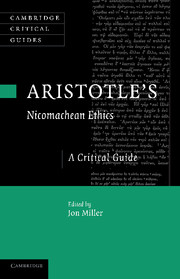Book contents
- Frontmatter
- Contents
- Contributors
- Acknowledgments
- Abbreviations and transliteration
- Introduction
- Part I Textual issues
- Part II Happiness
- Chapter 2 Living for the sake of an ultimate end
- Chapter 3 Contemplation and eudaimonia in the Nicomachean Ethics
- Chapter 4 Aristotle on eudaimonia, nous, and divinity
- Part III Philosophical psychology
- Part IV Virtues
- Bibliography
- Index
Chapter 3 - Contemplation and eudaimonia in the Nicomachean Ethics
Published online by Cambridge University Press: 07 September 2011
- Frontmatter
- Contents
- Contributors
- Acknowledgments
- Abbreviations and transliteration
- Introduction
- Part I Textual issues
- Part II Happiness
- Chapter 2 Living for the sake of an ultimate end
- Chapter 3 Contemplation and eudaimonia in the Nicomachean Ethics
- Chapter 4 Aristotle on eudaimonia, nous, and divinity
- Part III Philosophical psychology
- Part IV Virtues
- Bibliography
- Index
Summary
Over the years Aristotle’s discussion of contemplation and eudaimonia in Book x of the Nicomachean Ethics has been a thorn in the side of his readers. Some commentators have taken it to be inconsistent with the rest of the N.E., one even maintaining that it was not meant seriously but instead was an instance of irony. Among the reasons for these reactions are the following.
Although contemplation is mentioned in N.E. i.5 as a candidate for the good whose realization in a life constitutes a life of eudaimonia, almost all of the N.E. leading up to N.E. x is occupied with rather detailed discussions of ethical virtue, various specific ethical virtues, and topics such as practical wisdom, continence and incontinence, pleasure, and friendship, all of which have important connections with ethical virtue. In the middle of N.E. x, however, Aristotle seems to say that contemplation is the good whose realization in a life constitutes the primary form of eudaimonia. The political life, a life that includes the exercise of ethical virtue, is only a secondary form of eudaimonia. Where did this pre-eminence of contemplation come from? After all the attention he has given to ethical virtue, how could Aristotle relegate a life of ethical virtue to second place?
- Type
- Chapter
- Information
- Aristotle's Nicomachean EthicsA Critical Guide, pp. 66 - 91Publisher: Cambridge University PressPrint publication year: 2011
- 2
- Cited by

